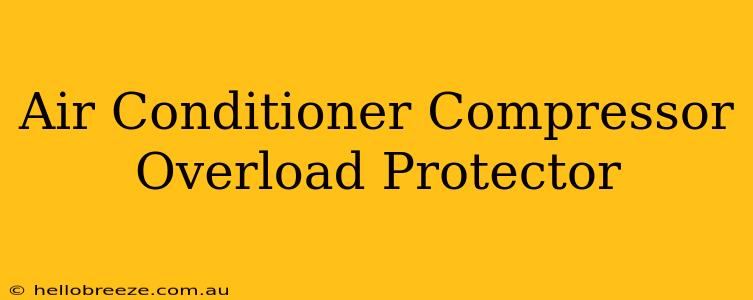Is your air conditioner struggling to keep up on those scorching summer days? The culprit might not be a failing compressor itself, but a problem with its silent guardian: the air conditioner compressor overload protector. This crucial component prevents damage to your AC unit by shutting it down when it detects excessive current draw. Understanding how it works, its importance, and troubleshooting potential problems is key to maintaining a cool, comfortable home and avoiding costly repairs.
What is an Air Conditioner Compressor Overload Protector?
An air conditioner compressor overload protector is a safety device, usually a thermal protector or a thermal fuse, integrated into the compressor's circuitry. Its primary function is to prevent compressor burnout due to overloads. This happens when the compressor is forced to work too hard, perhaps due to a restricted airflow, a refrigerant leak, or a faulty component elsewhere in the system. When the current draw exceeds a predetermined threshold, the overload protector trips, cutting power to the compressor to prevent damage. Think of it as a circuit breaker specifically for your AC compressor.
Types of Overload Protectors
While the function remains the same, there are a few different types of compressor overload protectors used in AC units:
- Thermal Protectors: These are usually bimetallic strips that bend and break the circuit when they reach a certain temperature. They reset automatically once they cool down.
- Thermal Fuses: These are one-time use fuses that melt and break the circuit when they reach a specified temperature. They need to be replaced if they trip.
Identifying which type is in your specific AC unit might require consulting the owner's manual or a qualified technician.
Why is the Overload Protector Important?
The air conditioner compressor overload protector plays a vital role in protecting your investment. A compressor is the most expensive component of an air conditioning system, and its failure can lead to significant repair bills. The protector prevents:
- Compressor Burnout: The most significant benefit is the prevention of catastrophic compressor failure due to overheating.
- Reduced Repair Costs: By preventing major damage, the protector saves you from costly compressor replacements or extensive repairs.
- Extended Lifespan: Protecting the compressor contributes to a longer lifespan for your entire AC unit.
Troubleshooting Your AC's Overload Protector
If your AC unit keeps shutting off, the overload protector might be the cause. Before calling a technician, try these basic troubleshooting steps:
1. Check for Obstructions:
- Airflow: Ensure that the airflow around the condenser unit (the outdoor part of your AC) is not restricted by debris, overgrown plants, or other obstructions. Clear any obstructions to improve airflow.
2. Inspect the Condenser Coils:
- Cleanliness: Dirty condenser coils restrict airflow and force the compressor to work harder. Clean the coils with a coil cleaning brush or a garden hose (low pressure).
3. Check for Refrigerant Leaks:
- Refrigerant Levels: A refrigerant leak reduces cooling capacity, causing the compressor to work harder. This requires professional attention as it is not a DIY repair.
4. Check the Electrical Connections:
- Secure Connections: Loose or corroded electrical connections can lead to higher current draw. Inspect and tighten any loose connections. (Caution: Only attempt this if you are experienced with electrical work. Otherwise, call a professional.)
When to Call a Professional
If the overload protector keeps tripping despite your efforts to improve airflow and clean the coils, it's time to call a qualified HVAC technician. The issue could be more serious, such as:
- Compressor Failure: The compressor itself might be failing.
- Refrigerant Leak: Requires professional attention to identify and repair.
- Electrical Problems: A more complex electrical issue requires the expertise of a trained technician.
Your air conditioner compressor overload protector is a critical safety feature that helps maintain the health and longevity of your air conditioning system. By understanding its function and taking simple preventative measures, you can ensure your AC unit runs smoothly and keeps you comfortable all summer long. Remember, regular maintenance and prompt attention to potential problems are essential for maximizing the efficiency and lifespan of your air conditioner.

